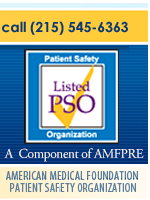Other Services
Expert Hearing Officers
Upon request, the Foundation will supply medical or surgical specialists and attorneys expert in hospital law to act as hearing officers under medical staff bylaws. The Foundation provides a full hearing panel (for example: two medical specialists and an attorney hearing officer) in order to fulfill the Health Care Quality Improvement Act mandate that panel members not be in economic competition with the affected physician.
Credentialing and Privileging
Hospitals and health care organizations are responsible for assuring the professional competence of staff physicians. We can offer assistance with credentialing and privileging to hospitals. We also respond to the increasing demand for credentialing for new technologies and procedures, as well as cross specialty credentialing. Demonstrated competence along with sufficient training and experience should be the basis of a fair credentialing program. We can assist in review of these criteria and offer practical solutions which may include preceptor programs under the Foundation for Advanced Medical Education.
Monitoring Temporary Privileges
To assure the professional competence of physicians who are seeking clinical privileges for the first time, hospitals or other health care facilities may wish to utilize a process that prospectively, but only conditionally privileges physicians. During this conditional period, an outside proctor may audit the physician’s patient records. This may include on-site observation of techniques. Upon accumulation of an adequate number of satisfactory cases, the Foundation will forward a recommendation regarding the granting of unconditional privileges to the physician at the health care facility. The physicians seeking privileges should agree to be bound by the results of the process.
Arbitration
The Foundation can assist in several ways in developing mechanisms for arbitration, which is a much speedier and less costly process than litigation for resolving differences. We can identify nationally prominent authorities to serve as arbitrators. They will be expert physicians in the same specialty as the physician in question or in some cases, physician attorneys or health attorneys. Agreeing to arbitration means acceptance of the findings and binding resolution of the issues. Arbitration can be in the form of an in-depth review of a physician’s practice by an arbitrator, or a hearing examer, or both. This agreement to be bound by the results of the process can help resolve privilege and other dilemmas without actual litigation.
Mediation
Mediation is a special form of negotiation that facilitates the reaching of an agreement through give and take between the parties in the presence of objective listeners. Mediation of both clinical and behavioral staff problems is often welcomed when the mediator is an experienced outsider with no personal interest in the outcome. The Foundation can provide experienced physicians, physician-attorneys, and attorneys with mediation experience. Although mediators do not have the power to impose a settlement as arbitrators do, they are trained and experienced in dispute resolution with the result being that achieving a settlement is more likely. Mediation is less adversarial than litigation or arbitration and is less disruptive to medical staff relations. If preconditions exist that both parties share a genuine desire to resolve the dispute, failure of the process is the exception.
AMF Services
Peer review of Individuals or Groups of Physicians >
Objective onsite appraisals of Specialty Services or Departments >
Review of Full Hospital and Interdepartmental Quality Evaluation >
Department review prior to negotiation or renewal of exclusive contracts >

